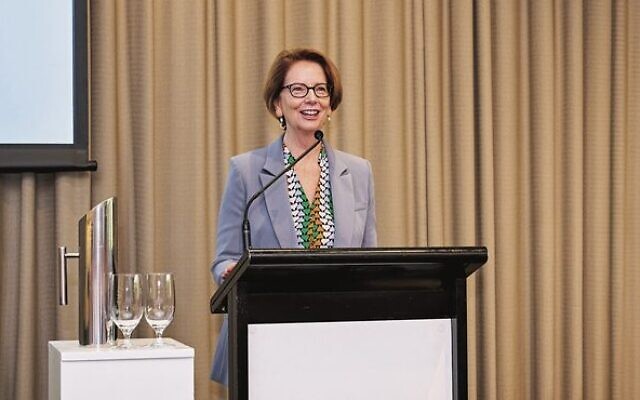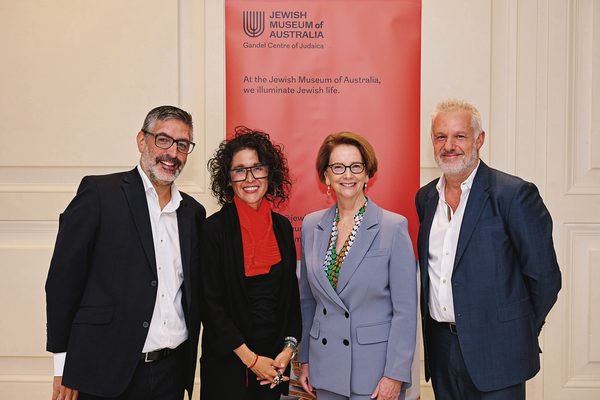Julia Gillard on retaining hope
The former PM spoke on the importance of museums for “truth telling and remembrance”.

Julia Gillard, the 27th prime minister of Australia, was the keynote speaker at a breakfast for around 400 people hosted by the Jewish Museum of Australia on March 19, an event supported by ANZ and The Australian Jewish News.
Gillard spoke on “The Contemporary Importance of Museums to Community Understanding” but she could not ignore the conflict between Israel and Hamas.
She said, “We meet today over five months since the horrific events of October 7. On that date and since, the people of Israel and Gaza have been engulfed in tragedy. Each day lives have been lost, families have grieved, any sense of safety has been obliterated and hostages have endured the physical and mental burdens of captivity, never knowing whether they will see their loved ones again.”
Gillard made her position clear – “I want all the hostages freed and returned. I want a ceasefire. I want massive aid to go into Gaza. And I want every effort made to forge at least the beginning of a two-state solution.”
This call comes after she signed a letter on October 30 along with five other former Australian prime ministers which strongly condemned Hamas and expressed solidarity with Jewish Australians facing antisemitism.

Returning to her topic, Gillard noted the importance of museums in countering hate amid resurgent antisemitism, “places of truth-telling and remembrance never matter more than in the darkest of times”. She added, “The Jewish Museum here embodies this spirit of remembrance and learning, infused with tikkun olam, the desire to improve our world. Nothing is more important than that right now.”
Gillard noted that along with promoting tolerance, museums are also grappling with “complex question of whose story is being told. Whose eyes are we looking through?” Adding, “Colonialism is not the only lens we need to look through to see who has voice and who is being excluded and rendered voiceless. Inequalities based on race, gender, sexual identity, disability and class are central here, as are other power imbalances.” She said these issues “intrigue” her as chair of the board of CVS Lane, as well as chair of Wellcome – a global charitable foundation to support science to solve health challenges, which also has a free museum and library based on the extensive collections of Henry Wellcome.
Regarding the role Jewish museums can play in countering antisemitism, she said, “As we know in this room the task of combating antisemitism and deepening prospects for sophisticated dialogue about what will bring peace is a daunting one. Yet it is a task we must face up to, given, as we can clearly see on social media, there is little understanding of the origins of the State of Israel, the nature of the conflict between Israel and Palestinians and the potential for peace. Instead, the online world seems awash with clumsy colonial analogies and conspiracy theories. In all of this work, the Jewish Museum will play an enormous role.”

Gillard affirmed her support for a two-state solution despite feeling it distant: “I am a firm believer in a two-state solution, in the ability of leaders to find a way to carve out a peaceful and prosperous future for two nations, side by side. I confess I have never felt more despairing about achieving that prospect in my lifetime than I have in recent months. I most assuredly do not have a full roadmap in my mind from where we are now to where we need to be. But I do have a hope that continues to flicker despite the horror of where we are now. A hope that says human beings can build peace, even after the most unimaginable horrors.”
During the Q&A, Gillard discussed the issue of gender equality and noted that she founded the Global Institute for Women’s Leadership (GIWL) at King’s College in London, and a sister one at the Australian National University in Canberra. As to whether she believes we are seeing progress on gender equality, Gillard said, “Some things are getting better,” such as paid parental leave and the treatment of women by traditional media, but expressed concern with social media and the “hardening of attitudes among sections of the community, particularly young men”.
Since leaving politics, Gillard has been dedicated to causes on gender equality and improving outcomes for education and health including mental health. She has been chair of Beyond Blue (2017 to 2023), chair of the Global Partnership of Education (2014 to 2021) and led the Royal Commission into Early Childhood Education and Care in South Australia. Gillard has also written three books – her memoir My Story, Women and Leadership: Real lives, Real Lessons co-authored with Dr Ngozi Okonjo-Iweala, and Not Now, Not Ever – Ten years on from the misogyny speech.
Jewish Museum of Australia director and CEO Noè Harsel said, “It was incredible to have the Honourable Julia Gillard AC speak to us about the pivotal role of museums in fostering dialogue, educating against antisemitism and championing inclusivity. At a time when our Jewish arts and creatives are being bullied and doxxed, the significance of Julia’s support for the JMA cannot be overstated. Here, we stand as a beacon of resilience, creativity and innovation, illuminating the enduring spirit of our community.”

comments